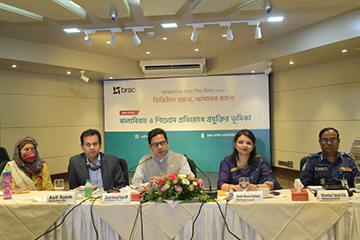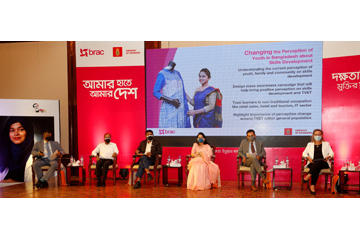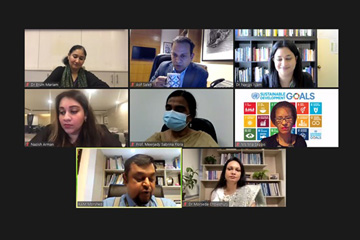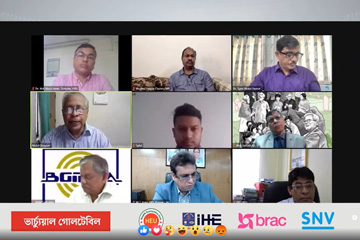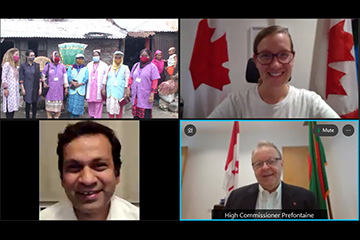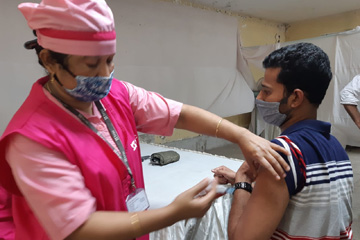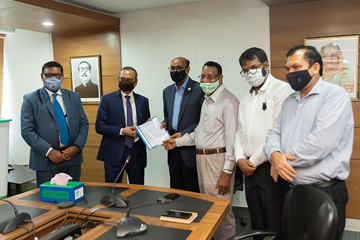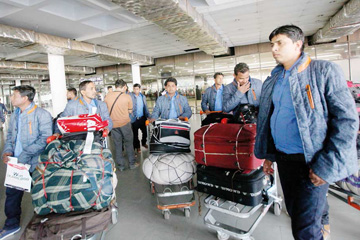
English (963)
Children categories
BRAC Declares an Extreme Poverty Emergency
Chris Law MP to chair an All Party Parliamentary Group on the issue
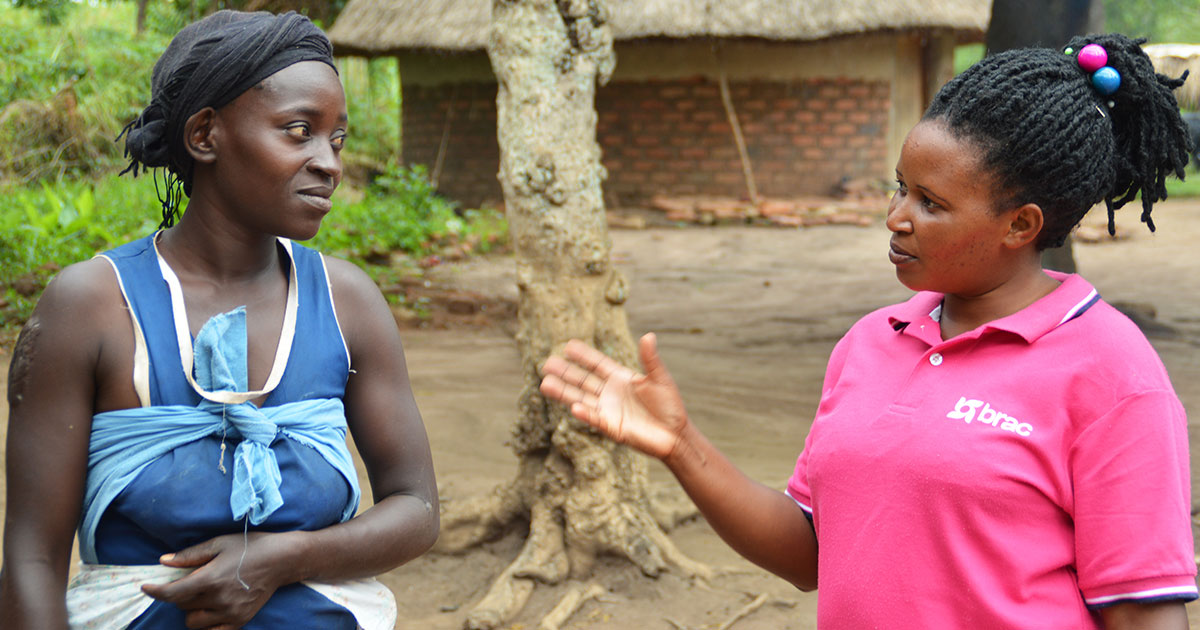
LONDON, 17 October 2021. Today a group of UK Members of Parliament (MP’s) and leading development experts, including BRAC, the largest NGO in the Global South, declared an emergency on extreme poverty.
Hundreds of millions of people worldwide have limited access to income, food, clean water, healthcare, and employment, which COVID-19 has further exacerbated, and this group is working to shine a light on the issue and demand urgent action through an All Party Parliamentary Group (APPG) on extreme poverty.
Recent estimates from the World Bank suggest that the pandemic will have pushed nearly 100 million more people into extreme poverty by the end of 2021, joining the nearly 700 million already living in extreme poverty. This has affected low-income countries most significantly, contributing to increases in child labor, gender inequality, and famine around the world. Even before COVID-19, progress on global poverty reduction was slowing and existing anti-poverty policies and programmes were missing many of the most marginalised populations, with 79 percent of the bottom quintile of earners in low-income countries receiving no social assistance whatsoever.
The APPG, which will convene key stakeholders working towards the eradication of extreme poverty, will be chaired by Chris Law, MP for Dundee West and the Scottish National Party’s (SNP) Spokesperson for International Development and Climate Justice. It also includes Tom Tugendhat (Conservative MP), Lyn Brown (Labour MP), Stephen Timms (Labour MP), Imran Hussain (Labour MP), Lord Purvis (Liberal Democrat Peer), and Brendan O’Hara (SNP MP) as Vice Chairs.
According to Shameran Abed, Executive Director of BRAC International, whose UK office is providing secretariat support for the APPG, “For decades, millions of people around the world have lived in a state of severe poverty and been excluded from existing development programmes. COVID-19 has further exacerbated the issue driving millions more to join them. The international community must take urgent action and respond to this emergency by committing significantly more resources and working together to support evidence- based programmes and ensure policies reach people who are furthest behind and meet their long-term needs. This is why we are declaring an extreme poverty global emergency today, on the International Day for the Eradication of Poverty.”
“Poverty is a policy choice,” said Chris Law MP. ”With sufficient political will, funding, and evidence, we can not only reverse the pandemic-driven rise in extreme poverty, but also make strides towards its eradication.”
“Having previously acted as a global leader on the eradication of extreme poverty, we are concerned that the UK Government has made no reference to it in its 2021 Integrated Review of Security, Defence, Development and Foreign Policy. Through the APPG, will we treat this issue with the urgency it deserves. We will hear directly from communities and organisations affected, examining all the evidence and making practical recommendations to the UK Government on how they can change this, and play a leadership role in helping the international community eradicate extreme poverty.”
Use of technology must be enhanced to combat child marriage and child labour
Child marriage and child labour are two major threats affecting the lives of girl children in Bangladesh. As both child marriage and child labour are driven by poverty and usually force girls to drop out of school, the increased economic hardships and prolonged school closures during the Covid-19 pandemic may well have exacerbated both these injustices. While Bangladesh had made commendable progress in advancing the rights and empowerment of girls in the past two decades, the scope for utilising communications technology to combat social injustices, such as child marriage and child labour, remains wide and largely unexplored.
Therefore, on the occassion of International Day of the Girl Child 2021, BRAC’s Gender Justice and Diversity (GJD) programme organised an advocacy dialogue on“Role of Technology in Combatting Child Marriage and Child Labour”today (Monday, October 11) at BRAC Centre, where discussants called for exploring technology as an effective yet under-utilised tool to tackle child marriage and child labour in the country.
Zunaid Ahmed Palak, State Minister for Information and Communication Technology (ICT), Government of Bangladesh attended the dialogue as the chief guest, and Asif Saleh, Executive Director of BRAC was also present. Nobonita Chowdhury, Director, GJD, BRAC moderated the whole session.
In his speech, Zunaid Ahmed Palak said the differential attitude for a boy versus girl child needs to be changed first to eliminate child marriage and child labour from the society. Technology, projects or plans will not be fruitful if the psychological and mindset change is not made. To prevent child marriage, we have designed a protocol called Bondhon.gov.bd where online marriage registration will be mandatory, but no marriage will be registered without a verifiable document which will ultimately eliminate any chance for child marriage. We will launch it soon.”
The state minister suggested using artificial intelligence in workplaces to combat child marriage. ICT Division of the government and BRAC can work jointly on elimination of child marriage and child labour through the use of technology, he added.
During the session, Asif Saleh, discussed the importance of protecting girl children from child marriage and child labour using technology. “We have to work relentlessly to eliminate the pervasive societal attitude to discriminate between girl and boy children. We have laws, but it is urgent that implementing agencies should be equipped with all the necessary technological solutions for effective execution of laws. We need to find out the underlying causes of child marriages and work towards changing the social psyche and that of the parents as well.”
He had also stressed equalising the digital divide currently existing among the girl and boy children, causing girls to be able to access technologies and devices less than the boys.
Nobonita Chowdhury, Director of Gender, Justice and Diversity (GJD) programme at BRAC said, ‘Even though the birth registration system in Bangladesh is being digitised, it is not yet mandatory to digitally verify birth registration when someone is being appointed for work or is registering their marriage. Therefore, forged or fake documents can often bypass the entire system. As a result, we do not have any statistics that accurately reflect the real child marriage or child labour scenario. So a thirteen year old girl can be passed off as an eighteen year old, in order to be married off or employed in work. The entire process can be strengthened by fully digitising the civil registration system, including the birth registration, marriage registration and employment’
Mohammad Abdul Wahed, President (Dhaka District), Bangladesh Muslim Niqah (Marriage) Registrar Samity spoke about how digitilisation of the age verification process during the marriage registration process can help registrars better tackle child marriages. Syeda Munira Sultana, National Specialist and Programme Coordinator at ILO Bangladesh spoke about the challenges of addressing child labour in Bangladesh and the scope of utilising technology to strenghten labour governance and inspection.
In the panel discussion, Mohammad Tabarak Ullah, Additional Deputy Inspector General (DIG) of Bangladesh Police at National Emergency Service discussed how the helpline has been stopping child marriages during the pandemic after getting calls from girls being married off, and other witnesses. Dr. Nova Ahmed, Associate Professor, Department of Electrical and Computer Engineering at North South University spoke about the importance of incorporating gender considerations when devising technological interventions intended to address social injustices such as child marriage and child labour based on examples from Bangladesh and beyond.
The dialogue opened with a presentation by Taqbir Huda, Advocacy Lead, GJD, BRAC, who said “We must focus on equipping birth registrars, marriage registrars and labour inspectors with digital verification tools to better enforce existing legal safeguards against child marriage and child labour. The government has already begun utilising technology to combat child marriage and child labour, such as by introducing national helplines, digitising birth registrations system, developing apps like LIMA - the labour inspection app and the pilot child marriage prevention app in Kurigram, so further investment needs to be towards strengthening these interventions.”
Prior to the pandemic, 51 percent of the young women in Bangladesh were married before they turned 18, according to a Multiple Cluster Indicator Survey (MICS) 2019 conducted by the Bangladesh Bureau of Statistics. The COVID-19 pandemic, which created 2.45 million new poor in the country, andincreased the likelihood of child marriage and child labour, due to worsened economic insecurity and prolonged school closures. In June 2021, International Labour Organization and UNICEF reported that for the first time in two decades, child labour was on the rise globally, including in South Asia, due to the socio-economic impact of Covid-19.
11 October marks the International Day of the Girl Child, a day on which countries around the world focus on the need to address the unique challenges girls in their countries face as well as recognise their human rights. The international theme for Girl Child Day this year is Digital Generation Our Generation, which focuses on equipping girls with digital solutions which can enable them to realise their full potential. Therefore, GJD, BRAC arranged this dialogue to serve as a basis to bring child marriage prevention and child labour prevention at the forefront of the discourse, and identifying the various ways in which technology is and can be used to combat both child marriage and child labour so the human rights of all girls in Bangladesh can be secured.
BRAC survey: 72pc of youths use internet, with only 28pc looking for technical and vocational education
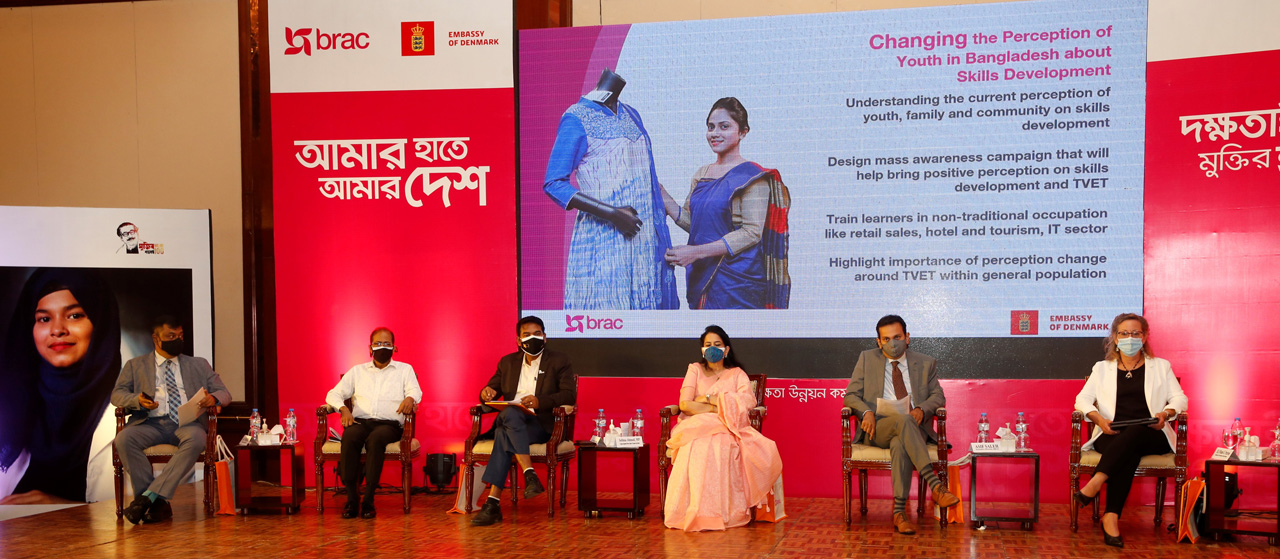
Among the youths of Bangladesh, 86 per cent have access to smartphones, overall 72 percent use the internet, while 28.3 percent have recently searched for materials and training related information on technical and vocational education and training (TVET).
A baseline survey on the youth perception about skills development training and post-training employment recently conducted by BRAC reveals this picture. Most (65 per cent) of the young people who have participated as respondents in the survey, identified facebook as the most effective digital platform for raising public awareness TVET.
This information and observations came at a national-level exchange-of-view event titled “Changing perspectives of youths regarding vocational education in Bangladesh” organised by BRAC today on Thursday (9 September).
KM Tariqul Islam, director general (Grade-1), NGO Affairs Bureau under the Prime Minister’s Office, Dulal Krishna Saha, executive chairman (secretary), National Skills Development Authority (NSDA), and Selima Ahmad, lawmaker and president, Bangladesh Women Chamber of Commerce & Industry (BWCCI), attended the event as special guests, arranged at a hotel in the capital.
Winnie Estrup Petersen, ambassador of Denmark to Bangladesh, spoke at the event as the guest of honour. Chaired by Asif Saleh, executive director, BRAC, the event was also attended by a number of high officials from government and non-governmental agencies.
Guests present at the event dwelt on the issue of employment generation and achieving economic prosperity through transforming the people, particularly the youths of this country into effective human resources through TVET and other kinds of skills development.
In his welcome speech, KAM Morshed, senior director, BRAC, said, stigma is associated with skills and vocational training in the society and we must partner with communities at large and fight together against this.
While presenting the keynote speech, Tasmiah Tabassum Rahman, current in-charge of BRAC Skills Development Programme, said jobs related to technical and vocational education in Bangladesh are still considered as blue collar jobs, and this is why it is very important to create awareness and tell the society about the importance of TVET and its prospects.
Speakers at the programme pointed out that despite the government has undertaken a number of measures to popularise TVET, the public perception has yet to change sufficiently in Bangladesh. Non-governmental organisations can play an important role, complementing the government efforts, in effectively changing perceptions at the community level, including in the communities living in the hard-to-reach areas. The NGO Affairs Bureau, as the regulatory body and as the custodian of the NGOs working in Bangladesh, can guide those organisations that are particularly registered for working in the skills development sector in playing a more effective role in raising public awareness. The Bureau can also work for widening the scope for Go-NGO collaboration in the sector.
NGO Affairs Bureau DG KM Tariqul Islam said, “Despite there are government run training centres in all the districts, bringing change in mindset should be the first task. Here the private and voluntary organisations have a role to play. This BRAC survey report (presented at the event) will be helpful for the government and other private sector organisations in offering training programmes. We expect that private sector stakeholders will build infrastructures and provide training to youths in the areas where the government training centres do not have wide coverage of services.”
NSDA executive chairman Dulal Krishna Saha said, “We have to maintain the productivity of our labour force to maintain the growth we have achieved in different sectors. Without skills we won’t be able to sustain ourselves in the fourth industrial revolution. We do, therefore, need an intensive awareness campaign both to attract foreign investment and build a vast pool of skilled manpower.”
Winnie Estrup Petersen, ambassador of Denmark to Bangladesh, said “We need to listen to the young voices and enter into a dialogue with them under an inclusive approach. Stakeholders form the public private sector and partners need to think about how to change the mindsets of young people. This can be done through adequate campaigns and ultimately the youths need to be prepared with the right skills and right mindset for the changing world.”
BWCCI president Selima Ahmad said “Providing training to the young population is not enough, we also need to create work opportunities for them as well. It needs a media campaign, engaging community leaders and public representatives so that they can encourage their communities to take technical and vocational training. Also, organisations like BRAC can introduce programmes on public awareness and training in areas with higher trends of manpower export.”
In his concluding remarks BRAC executive director Asif Saleh said, “It’s never enough to erect only the buildings of training centres. We have to focus on the training itself so that by utilising that skills training they can secure jobs for themselves, or become entrepreneurs, or can engage in income generating activities and improve their living standard eventually. We need to change the role of how we approach skills development and youth employment. We are ready to support the Bangladesh government and scale up new innovative solutions for TVET.”
While carrying out its different initiatives BRAC’s Skills Development Programme (SDP) came to realise that skills development of the mass of young people will open the door to an infinite opportunity for realising their potential leading to the country’s robust socio-economic development.
In this context BRAC SDP has undertaken this pilot project with funding from the Danish Embassy to increase people’s awareness and knowledge about the importance of TVET and the resulting potential employment opportunities. The pilot is under implementation in three divisions, namely Dhaka, Chattagram and Sylhet.
As part of the pilot, a baseline survey was conducted to know about the perception of young people regarding skills training and employment, an excerpt of which is below.
- The respondents believe that the most important reason for choosing TVET is to get jobs soon as possible. Of the respondents 43.7% said the idea of such training just did not occur to them.
- Women should have more opportunities for taking TVET particularly in the unconventional occupations such as light engineering and mechanical and other kinds of repair work.
- Of the respondents, 65% identified facebook as the most effective digital platform to raise awareness on TVET.
Study: click here.
BRAC launches Mental Health Strategy

The strategy pledges to raise public awareness and education of mental health difficulties, tackle stigma, and provide communities with culturally appropriate needs-based mental health interventions.
Although mental health issues pose considerable public health risks, claiming more lives than Covid-19, Bangladesh still lacks resources essential to undertake the necessary interventions. The consequence is, people cannot enjoy their right to the highest standard of physical and mental health.
As Bangladesh continues to weather the ongoing impact of the Covid-19 pandemic, BRAC feels the issue of mental health in the country needs to be tackled with a comprehensive approach, and in strong partnership with the government.
In the presence of speakers from the government and non-government agencies, BRAC launched its first Mental Health Strategy at a virtual event organised today, Wednesday (25 August 2021). The event was chaired by Asif Saleh, executive director, BRAC, and moderated by KAM Morshed, senior director, BRAC.
Professor Meerjady Sabrina Flora, additional director general (planning), Directorate General of Health Services, attended the programme as the chief guest. Dr Robed Amin, line director, Non-Communicable Disease Control (NCDC), Government of Bangladesh, and Mia Seppo, UN resident coordinator, Bangladesh, were present special guests at the event.
The strategy sets out the organisation's commitment towards improving mental health of the population and developing mental health services and activities that are effective and ethical.
To achieve this, the strategy outlines four strategic aims and associated goals to meet by 2030. BRAC is committed to working alongside the Government of Bangladesh and other stakeholders, to address the current and future mental health needs of the country.
Grounded in an approach that espouses, endorses and advocates for culturally congruent, respectful and compassionate ethos, BRAC’s Mental Health Strategy pledges to raise public awareness and education of mental health difficulties, tackle stigma, and provide communities with culturally appropriate needs-based mental health interventions.
Dr Nargis Islam, consulting clinical psychologist, Oxford (UK), and consultant for BRAC Institute of Educational Development (BRAC IED), presented the details of BRAC Mental Health Strategy at the event. The blueprint of this strategy comes from the proven paracounsellor model that has been developed and executed successfully by BRAC IED in the past. While sharing her experiences in executing the paracounselling model, Dr Erum Mariam, executive director, BRAC IED, BRAC Bangladesh, said, “We did not call it mental health but over the past 49 years we connected with communities, supported and gave people hope and ensured their dignity. It is a moment of celebration that we have been able to build on our work and articulate the first Mental Health Strategy for BRAC!”
Dr Morseda Chowdhury, director, Health, Nutrition and Population Programme at BRAC, explained the design of a pilot to test BRAC’s mental health model at a large scale. She said, “Action at local and national levels to implement this strategy will only be effective if there is sustained and reciprocal partnership working across all sectors, and as such, will be the focus for achieving successful implementation of the strategy.”
Professor Meerjady Sabrina Flora, additional DG, DGHS, said “Improving mental health services is one of the key health related agendas for the government right now. The government and non-government actors can work together in a multi-sectoral approach to improve the mental health situation in the country. We need to fight together to reach a common goal which will give us a mentally healthy nation, a mentally healthy Bangladesh.”
Mia Seppo, UN resident coordinator, Bangladesh, said “17% of adults in Bangladesh live with mental health issues. We must cater to the rising need for mental health support by mainstreaming appropriate services within the existing health system. Mental health is just as important as physical health.”
Asif Saleh, executive director, BRAC, said “BRAC’s founder Sir Fazle Hasan Abed believed that mental health and wellbeing were a crucial and underserved component of public health. Now, particularly against the backdrop of Covid-19 and the toll it has taken on our mental wellbeing, it is time to work together to improve the access to mental health services in Bangladesh. BRAC has developed a comprehensive strategy to reach the last mile with mental health services. And, now we need other partners - the Government of Bangladesh, non-government organisations, private actors, and development partners - to move the work forward collaboratively.”
Experts in the mental health services in Bangladesh, high officials from other government and non-government agencies and representatives from various global organisations also joined the virtual event.
Roundtable: Health Insurance for RMG workers HI cuts out of pocket spending, adds productivity

Chairperson of the Parliamentary Standing Committee for Labour and Employment Ministry Md. Mujibul Huq MP underscored the national initiative of health insurance coverage for readymade garment workers and other sectors’ wage earners in collaboration with government and private entities. He asked public insurance companies to offer health insurance for low-income earners.
He came up with the call while addressing a virtual roundtable on “Health Insurance for RMG Workers in Bangladesh: Designing Policy and Management Structure” on Wednesday. Health Economics Unit (HEU) of Health and Family Welfare Ministry, Institute of Health Economics (IHE) of Dhaka University, BRAC, Netherland-based development organisation SNV and vernacular daily Prothom Alo conjointly arranged the roundtable.
HEU Director-General Dr. Md. Shahadat Hossain Mahamud, DG, HEU, said that the RMG sector already has a systematic and formal structure in collaboration with BGMEA, BKMEA, and Labour and Employment Ministry’s Central Fund, which enables the sector to be the initiator of institutional health insurance policy for workers’ wellbeing. Other sectors’ workers could be brought under health insurance in phases.
BRAC Climate Change and Urban Development programmes director Dr. Md. Liakath Ali said the country should introduce health insurance for wage-earners and the RMG sector is ready to introduce it that can be scaled up in other sectors after success in RMG.
Bangladesh Diabetic Association Chairman AK Azad Khan suggested that health insurance should be tax-free.
Representatives of different organizations were also spoke in the roundtable. Facilitated by Prothom Alo’s assistant editor Firoz Choudhury, the roundtable was also addressed by Central Fund DG Dr Selina Akter, HEI Professor Dr Syed Abdul Hamid, HEU’s research director Dr Md Nurul Amin, ANM Saifuddin from BGMEA, Mohammad Hatem from BKMEA, Progoti Life Insurance CEO M Jalaul Azim, Gonosastha Kendra’s Dr Rejaul Huq, and Bangladesh Garments Workers’ League president Sirajul Alam Rony.
In the Keynote Dr. Syed Abdul Hamid said that different NGOs operate various pilot health insurance projects to safeguard RMG workers. Research found that participation in the health insurance eased heath care cost and increase productivity of RMG workers. Although most of the projects’ timeline is at the end, no policy or management framework has been developed yet to advance the project or undertake permanent initiatives. Therefore, the establishment of a social health insurance management unit in collaboration with all stakeholders including the government, factory owners and the workers.
The discussion also informed that a network involving HEU, IHE, BRAC, SNV and Ganashastho Kendro have been working for policy formulation and the establishment of the institutional infrastructure to the policy formulation levels.
Canada joins BRAC in Strategic Partnership to support the vulnerable

Today, the Honourable Karina Gould, Minister of International Development, announced CAD 45 million, over the next five years, to support increasing services to Bangladesh’s most vulnerable populations, including the hard-to-reach.
Canada is committed to investing in partnerships to support the most marginalized, including women and girls in Bangladesh. Canada’s support will fund BRAC led multi-sector initiatives, including programming in skills and vocational training and public health outreach tailored to reach children and families that are unable to access the services they need. It will also strengthen BRAC’s interventions related to human rights, sexual and reproductive health and rights, nutrition and ending gender-based violence against women and children. Programming will also focus on, and support, Bangladesh’s COVID-19 response and inclusive economic recovery.
With this contribution Canada joins the Strategic Partnership Agreement, a long-term tripartite partnership with BRAC and the Government of Australia. Canada’s contributions to the partnership will expand BRAC’s integrated healthcare, education, legal services, skills development and livelihood service delivery to hard-to-reach areas and the most marginalised populations. This partnership is closely aligned with Canada’s Feminist International Assistance Policy and is built on BRAC’s longstanding women-centred development approach which prioritises the empowerment of women and girls.
The announcement was made during Minister Gould’s virtual visit to Bangladesh. Today, Minister Gould visited Bhashantek slum in Dhaka to see first-hand the impacts of BRAC’s urban development programming, which will receive continued support through the partnership. Minister Gould also met with young women engaged in skills training, health care workers supporting soon-to-be-mothers, and witnessed the BRAC-led COVID-19 prevention and response activities in action. BRAC Executive Director Asif Saleh accompanied the Minister on the visit, with both acknowledging the courageous front line workers who continue to deliver key services in the face of ongoing challenges during the pandemic.
Quotes
“Our local, experienced partners know all too well the disproportionate impact the COVID-19 crisis has had on the world’s most vulnerable. Together, we must continue to push forward and seek out those hardest to reach, including marginalized women and children. Canada remains committed to supporting Bangladesh in addressing the impacts of the pandemic and helping vulnerable populations respond and recover as fast as possible”
- Karina Gould, Minister of International Development
We are delighted to welcome Global Affairs Canada as one of our strategic partners. This partnership couldn't come at a more critical time, as the COVID-19 pandemic has further aggregated inequalities in Bangladesh. Bangladesh needs resources to combat the impact of this pandemic and sustain the momentum of socio-economic growth. This partnership will help us to keep the country on the growth trajectory and to continue our efforts in the pandemic response and the recovery process.”
- Asif Saleh, Executive Director, BRAC
BRAC partners with Bangladesh government’s Covid-19 vaccination drive
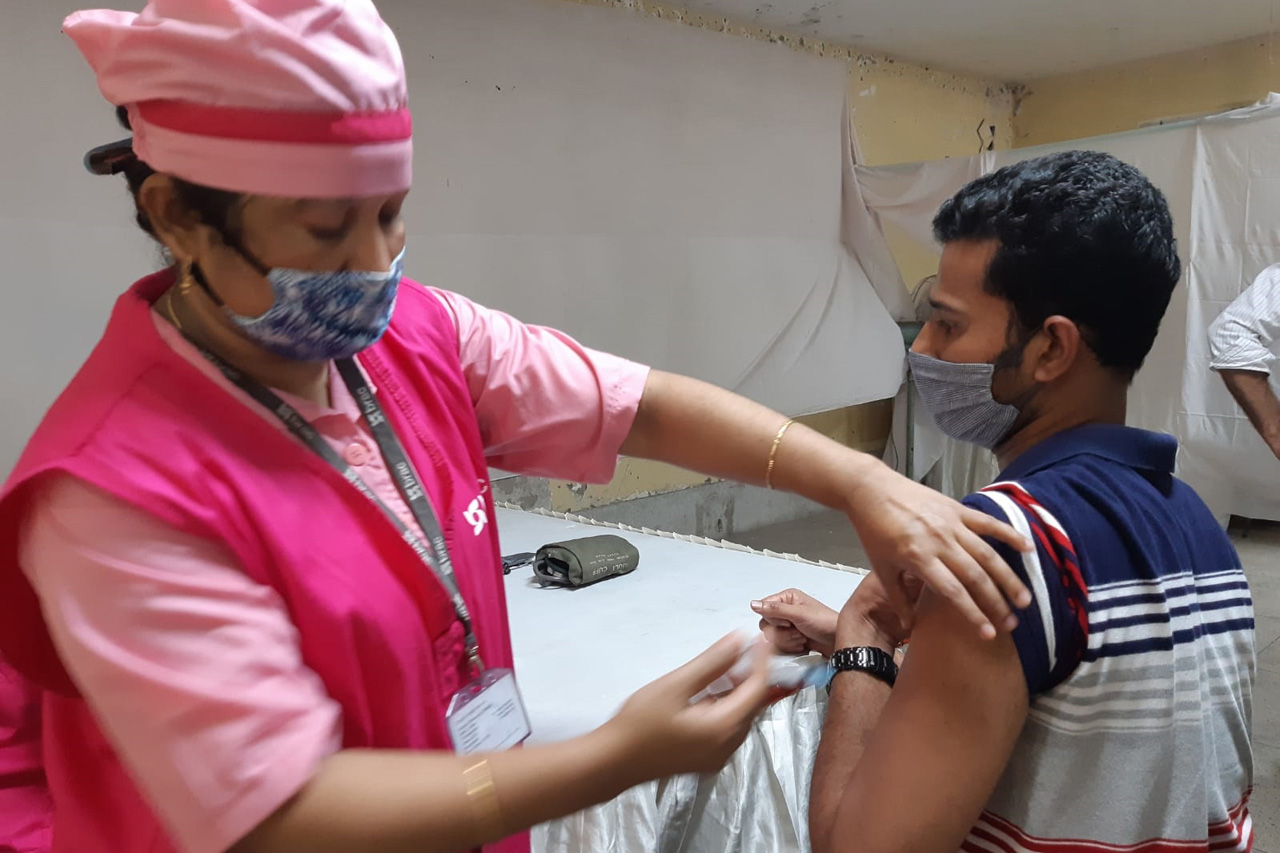
It will manage vaccine administration at Dhaka’s 9 centres and provide assistance at 3214 union level centres
BRAC joins as a partner of Bangladesh government's Covid-19 vaccination drive to accelerate resilience against the pandemic. The development organisation is managing vaccine administration in nine centres of Dhaka from today (Saturday), with the help of midwives from BRAC James P Grant School of Public Health. It is also assisting the government in 3,214 centers at the union level across Bangladesh.
BRAC has joined in the vaccination campaign from today in support of Dhaka’s two city corporations to speed up the vaccination drive.
People aged 25 years and above can get the vaccine by showing their national identity card between 9am and 3pm every day from BRAC-managed centres. The service will remain open till August 12. An aspirant must bring a photocopy of NID card or the vaccine registration card registered with the Shurokkha App to receive the latest vaccine.
The centres are offering vaccine doses only for those who have registered with the Shurokkha App but have yet to receive a short message service confirming the date of vaccination. Each of these BRAC-managed centres in Dhaka city can administer 350 doses per day.
Women, elderly population (over 50 years) and people with disabilities are prioritised in vaccination from these centres. Only the first dose of the vaccine is offered from these centres and will mention the date of the second dose in the vaccine card.
Dr Morseda Chowdhury, director of Health, Nutrition and Population Programme (HNPP) at BRAC, said, “BRAC has engaged itself in Covid-19 prevention activities since the global pandemic began. As part of it, we have mobilised our capacities to accelerate the government’s Covid-19 vaccination campaign. We aim to ensure vaccine administration management in a disciplined way everywhere, including hard-to-reach areas. We believe a combined effort by everyone is essential in the fight against the pandemic.”
The nine centres BRAC is operating in the two city corporations in Dhaka city are: Nurer Chala Government School and Shaheed Turjo Primary School in Badda under the Dhaka North City Corporation, and councillor office in Paltan Community Centre, Dingi in Dhanmondi 8/A (beside the lake), councillor office in Dhanmondi Community Centre at Bhuter Goli on Dhanmondi Circular Road, councillor office in Hatirpool Kacha Bajar (158/1, Elephant Road), councillor office in Shegunbagicha multipurpose complex, Fakir Chan Sarder Community Centre in Narinda, and MA Sattar High School in Demra under Dhaka South City Corporation.
BRAC's Tk 1,350 crore bond gets MRA approval
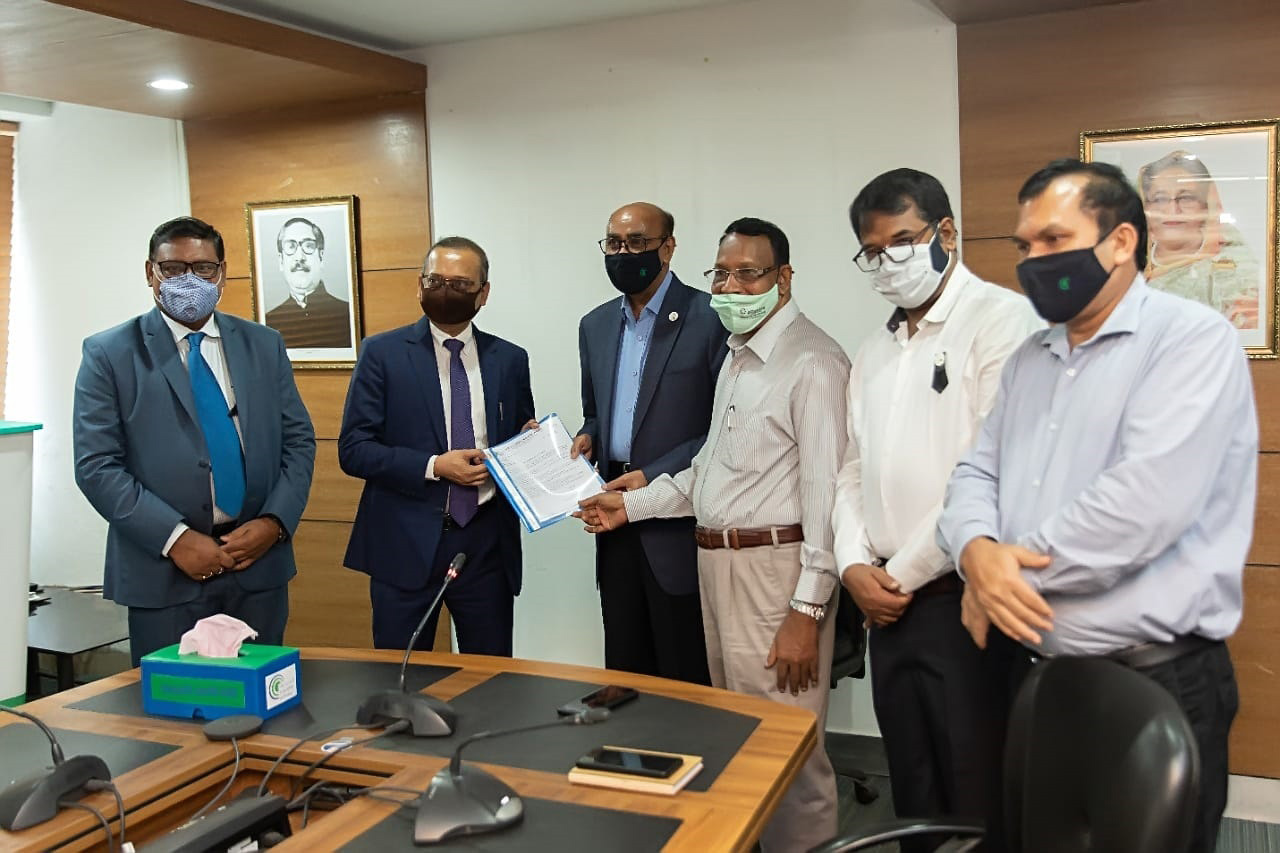
BRAC, the largest microcredit provider in Bangladesh, has received approval from Microcredit Regulatory Authority (MRA) to issue zero-coupon bonds valued BDT 1,350 crore through private placement. Issuance of zero coupon bond by a non-governmental organisation is the first of its kind in microcredit history of Bangladesh.
Executive vice chairman of MRA Md Fashiullah handed over the much anticipated approval letter to Tushar Bhowmik, chief financial officer of BRAC, in a small ceremony arranged by MRA on its own premises on Thursday (5 August) afternoon.
MRA executive director Laxman Chandra Debnath, directors Muhammad Mazedul Haque and Md Nure Alom Mahadi and BRAC associate director Ashit Baran Das were also present at the ceremony.
Earlier on February 3, Bangladesh Securities and Exchange Commission (BSEC) also approved the issuance of this zero-coupon bonds valued Tk1,350 crore.
The bond is unsecured, non-convertible, and fully redeemable with its tenure from one and a half years to five years. Institutional investors, corporates and high net worth individuals will be eligible to purchase this bond with a multiple of BDT 10 million. RSA Advisory Limited is acting as a lead arranger of this issue and MTB Capital Limited is acting as trustee to the issue.
“Client’s savings and bank borrowings was the main source of funds for BRAC Microfinance. Now Bond issuance also comes as an alternative source of funding for the microcredit institutions,” BRAC CFO Tushar Bhowmik said.
The CFO expected that the bonds would open up avenues for non-lender institutions to invest in BRAC's microfinance programme. He commented that it is a great recognition for the microfinance sector and expressed gratitude to all regulatory bodies for the cooperation along the way.
BRAC expects that the bonds will help improve the livelihoods of people who need access to affordable financial solutions, especially in marginalised communities, in a more efficient way.
BRAC’s journey began in Sulla, in northeast Bangladesh in 1972. Having access to finance was necessary for people living in poverty to break the cycle. Understanding their need, the first loans given by BRAC were in 1974 to fishermen in Sulla. Till date, BRAC microfinance programme has reached 7.4 million clients with financial services.
Standard Chartered, BRAC to develop returnee migrant workers into entrepreneurs

File photo shows migrant workers at the Dhaka airport Mehedi Hasan/Dhaka Tribune/
Standard Chartered Bangladesh and BRAC have announced the launch of a Covid-19 response initiative that will work with returnee migrant workers to ensure economic self-reliance through skills and entrepreneurship development.
The Standard Chartered Foundation is financing the two-year project titled “Covid-19 recovery: Entrepreneurship Training and Gainful Employment for Returnee Migrants Affected by Covid-19 in Bangladesh,” reads a press release.
According to the Ministry of Expatriates’ Welfare and Overseas Employment, more than 400,000 migrants returned to their home country within a year due to the ongoing pandemic.
Recent BRAC survey findings suggest that half of the returnee migrants could not find gainful employment upon their return.
Under this project, the returnee migrants affected by Covid-19 will be supported with emergency arrival assistance, counselling, and entrepreneurship training followed by in-kind financial assistance as business award money to start their new business, which will support their sustainable economic reintegration.
The project will also link beneficiaries with microfinance institutes to facilitate access to finance and provide emergency and psycho-social support.
The project will identify and trace beneficiaries through several sources, including the airport, community members, hotline and other referrals. Three Reintegration Support Centres will be established under the project.
Preference will be given to more vulnerable demographics, particularly women and youths aged between 18 and 35 years.
Beneficiaries will be identified from three districts — Dhaka, Chattogram and Cumilla.
Naser Ezaz Bijoy, CEO of Standard Chartered Bangladesh, said the return of migrant workers could be seen as a challenge for our economy, but it is also an opportunity.
“Through harnessing the skills and knowledge, they have gained throughout their overseas careers and channelling it towards entrepreneurship and gainful employment opportunities, our remittance earners will not only ensure their own economic self-reliance but also create more opportunities for the broader community, multiplying the recovery momentum at the root-levels,” he added.
He also said Standard Chartered is delighted to work with BRAC on this initiative, adopting the reintegration model implemented by the NGO since 2006, which has already helped 3.5 million people across 64 districts of Bangladesh.
Asif Saleh, executive director of BRAC, said that for systematic changes, a meaningful partnership is required for the welfare of migrant workers in Bangladesh.
Covid-19 left many migrants jobless with new learning where for all actors, government and non-government need to work together to support returnee migrants for their economic and social reintegration back into our society, he added.
“We have to do more work with fewer resources — there comes partnership. The main focus is to support returnee migrant workers with entrepreneurship skills development and other support services for small-scale businesses that will change and improve the local economy," Saleh further said.
See also: Financialexpress.com.bd, Financial Express, Ittefaq, Samakal, Business Standard, Daily Observer, Daily Sun, New Nation, Bonik Barta, Bhorer Kagoj, Sangbad, Bangladesh , Post, Manob Kantha, Amader Orthoneeti, Shomoyer Alo, Protidiner Sangbad, News Time, Samakal.com, Bdnews24.com, Ittefaq.com.bd, Observerbd.com, Daily-sun.com, Thenewnation.com, Bonikbarta.net, Inqilab.com, Bhorerkagoj.net, Sunbd24.com, Thesangbad.net, Thesangbad.net, Bangladeshpost.net, Tbsnews.net, Newspapers71.com, Lastnewsbd.com, Protidinersangbad.com, Bvnews24.com, Businessinsiderbd.com
BRAC starts antigen testing in 9 cattle markets in the capital

BRAC has launched antigen-based Covid-19 rapid testing in nine cattle markets under the Dhaka North City Corporation (DNCC) from today on Sunday (18 July). The Directorate General of Health Services (DGHS) is providing necessary support to set up one Surokkha corner in each of these cattle markets where BRAC staff is carrying out the sample collection service. The Foreign, Commonwealth & Development Office (FCDO) of the Government of UK is supporting BRAC and DGHS in this effort.
DNCC mayor Atiqul Islam inaugurated the operations of Surokkha corners at the cattle market at Sayeednagar in Bhatara about 11am this morning. Dr Mirna Zaman, manager technical of BRAC’s Health, Nutrition and Population Programme (HNPP), was present, among others at the event. She informed the mayor about the different aspects of this initiative.
Starting from today the service will continue till 20 July (Tuesday), the previous day of Eid, and will be available from 8am to 8pm. Anyone experiencing Covid-19 symptoms like fever, dry cough, fatigue, sore throat and respiratory difficulties, or has been in contact with a confirmed Covid patient, is eligible to undergo the test through Surokkha corners. One has to pay the fee fixed by the government to get the service. Prior registration is not required to give the samples. Each of the Surokkha corners will be able to collect and analyse 150 samples a day.
If the result of a sample analysed via antigen testing comes positive i.e. detects the presence of novel coronavirus, the service seeker will be notified within 30 minutes. Results of a positive patient tested via antigen testing will be uploaded to the website within 3-4 hours.
The nine cattle markets to have these Surokkha corners are: The open space inside the Section-3 of Block-E of Badda Eastern Housing (Aftabnagar), open space adjacent to Kaula Shiyaldanga, open space adjacent to Shahinagar housing (residential) project at Uttarkhan Moinertek, open space from Brindabon to north of BGMEA in Uttara Sector-17, temporary cattle market in Bhatara (Sayeednagar), Rajdhani Housing adjacent to 40-feet Road in Basila Mohammadpur, open space of Shopnodhara housing and Basila Garden City; open space owned by Salam Steel Ltd and Jumuna Housing Co to the north of and adjacent to 300ft Road under Ward-43 and Gabtoli cattle market in Mirpur.
Mayor Atiqul Islam said at the inauguration event, “This is a truly praiseworthy initiative from BRAC at this crisis moment of the pandemic. We are calling on other organisations also to come forward with initiatives as much as they can afford.”
Currently in Bangladesh, for Covid-19 diagnosis RT-PCR tests are done for the majority of samples that take at least 24 hours to deliver results. As antigen tests can deliver results only in 30 minutes, BRAC expects that this method will add pace to the government’s Covid-19 testing operations.
Director of BRAC Health, Nutrition and Population Programme (HNPP) Morseda Chowdhury said, “The cattle markets set up for Eid-ul-Azha are among high risk spots for Corona virus transmission due to mass gatherings. BRAC has joined Dhaka North City Corporation in this effort to reduce the level of vulnerability. We are distributing masks as part of our awareness campaign. The overall risk of contracting the infection will reduce when people who have already contracted Covid-19 will be identified through antigen testing.”
Responding to the government’s call in covid-19 prevention campaign, BRAC’s walk-in kiosks have been collecting samples from the suspected patients since March 11 last year, among which 41 are currently in operation. Additionally, BRAC has been offering antigen-based rapid testing through 16 booths in Dhaka and Chittagong since 24 April this year.
Join the world’s biggest family


